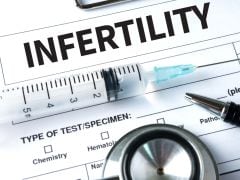Diet plays a crucial role in managing PCOD. Let's find out if you can consume gluten if you have PCOD?

A healthy diet can help manage PCOS symptoms
PCOD- Polycystic Ovarian Disease involves dysregulation of primarily hormones- estrogen, progesterone, FSH (follicle stimulating hormone), and LH (luteinizing hormone). The condition gets its name from a characteristic symptom of the disease wherein the ovaries develop cysts due to which they do not release egg periodically as they're supposed to.
But this is just one of the characteristic symptoms because you can get a PCOD diagnosis without actually having ovarian cysts. The other two characteristic symptoms of PCOD are
a) irregular periods and
b) elevated levels of the male hormone, androgen
The latter commonly results in symptoms like excessive facial and body hair growth, acne, and male-pattern scalp hair thinning. Other PCOS symptoms include pelvic pain, infertility, fat gain, skin darkening and excess menstrual bleeding.
What causes PCOD?
Conventional medicine does not officially recognise any specific cause for PCOD. Genetics and metabolic health are known to be important factors in causation though.
We do know that diet and lifestyle changes have a remarkable effect on reversing PCOD.
PCOD patients are very often asked to lose weight because improving metabolic health helps very significantly with the condition.
The reason for this is very evident from the medical literature which demonstrates how the condition is primarily caused by insulin resistance(the biggest driver of metabolic illness) and inflammation.
The role of gluten
Gluten is this protein found in wheat, barley and rye and in a very wide range of food products and dishes owing to so many ingredients today being derived from wheat. This is what makes it particularly challenging to go gluten-free.
Individuals who suffer from a condition called Celiac Disease (estimated to be around 1% of the population) experience strong allergic reactions to gluten and need to avoid it very strictly.
But it has been found that even individuals without Celiac experience some degree of gluten intolerance, with the intolerance manifesting as inflammation which can present through a variety of different symptoms. This has been termed as non-celiac gluten sensitivity or NCGS and is estimated to affect up to 30 percent of the population. NGCS has been shown to be associated with elevated levels of inflammatory markers and a host of medical conditions like metabolic disease, obesity, neurological issues, and cardiovascular issues.
Gluten is an indigestible protein that our bodies cannot break down, and this undigested protein damages our gut lining to a small degree every time we consume it. It damages the finger-like projections called villi in our gut lining that facilitate nutrient absorption. It has been shown to increase the expression of a protein called zonulin, which increases the gaps in the gut wall. This leads to a condition called leaky gut which is the root cause of most inflammation. In leaky gut, due to gaps in the gut wall, undigested food particles leak into the bloodstream, creating inflammation. Only In a section of the population do the above-mentioned damaging effects of gluten ingestion present immediately as symptoms, and we label this as Celiac Disease or gluten sensitivity.
While there is no direct research on links between gluten and PCOD, the mechanism for it is fairly well demonstrated, as mentioned above. Gluten drives inflammation and insulin resistance which cause PCOS. Clinical data also confirms the same. PCOD sufferers very commonly report improvement of symptoms upon going gluten-free. Hashimoto's Disease, an autoimmune thyroid condition very commonly occurs in conjunction with PCOD. And Hashimoto's is very strongly associated with gluten intolerance.
Gluten-free diets have been shown to improve metabolic and hormonal health-both very critical in the causation of PCOD.
To conclude, it is important to note that while gluten does make PCOD worse, it is most definitely not the only or even the primary cause of the condition. Excessive consumption of refined sugars and carbohydrates and refined seed oils(all of which are rampant in processed foods) are the biggest culprits behind insulin resistance, which we know is the biggest driver of PCOD. There can be many other causes, too, such as adrenal dysfunction or birth control treatment withdrawal(post-pill PCOS). Cutting out gluten and processed foods and improving metabolic health will surely help all PCOD sufferers, but complicated cases may require medical intervention involving advanced testing to uncover and treat the root cause.
(Functional Nutritionist Mugdha Pradhan, CEO and Founder, iThrive)
Disclaimer: The opinions expressed within this article are the personal opinions of the author. NDTV is not responsible for the accuracy, completeness, suitability, or validity of any information in this article. All information is provided on an as-is basis. The information, facts, or opinions appearing in the article do not reflect the views of NDTV and NDTV does not assume any responsibility or liability for the same.
DoctorNDTV is the one stop site for all your health needs providing the most credible health information, health news and tips with expert advice on healthy living, diet plans, informative videos etc. You can get the most relevant and accurate info you need about health problems like diabetes, cancer, pregnancy, HIV and AIDS, weight loss and many other lifestyle diseases. We have a panel of over 350 experts who help us develop content by giving their valuable inputs and bringing to us the latest in the world of healthcare.














